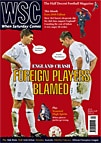 Jon Spurling braces himself for a festive football hangover
Jon Spurling braces himself for a festive football hangover
Along with communal baths, a crafty drag on a cigarette in the toilets, and swigging a bottle of brown ale with the lads, Christmas parties are entwined in the fabric of English football. “The players have talked of little else for weeks,” confided Ian Rush – dressed in Beefeater garb for Liverpool’s bash – to a BBC reporter in 1992. “All the lads have made the effort to dress up,” added Rushie, as Bruce “The Joker” Grobbelaar and John “Dick Turpin” Barnes staggered past clutching empty Grolsch bottles. Despite the cameraman’s best efforts, viewers also saw David Burrows – clad as an SS officer – flicking sieg heil salutes, at a time when Israel striker Ronnie Rosenthal was with the club. The whole interview encapsulated perfectly many of the idiosyncrasies of English football: heavy boozing and distasteful pranks were acceptable if they helped forge team spirit.
In the days of the maximum wage, the Christmas party was one of the few perks players received, as many clubs opened up a slate in local hostelries to let them enjoy the evening. Pongo Waring, Aston Villa’s star striker between the wars, recalled: “It was one of the few times when players and directors mixed, although they still insisted on calling me ‘Waring’ all night.” In later decades, increasingly affluent players became involved in car crashes, nightclub brawls, and assorted back-alley liaisons after a skin full in the festive season. Ossie Ardiles’s bewildered reaction to Tottenham’s raucous 1979 Christmas party (“I wouldn’t have thought it possible that any group of men would have the stamina or willpower to down pint after pint in such rapid succession”) was a portent of things to come, but an increasingly intrusive press corps meant that players’ indiscretions were coming under growing scrutiny.
West Ham’s 1998 Christmas party went awry after Neil Ruddock and Trevor Sinclair were snapped – and subsequently arrested for criminal damage – doing John Travolta impressions on the roof of a car. The same year, Liverpool rookie Jamie Carragher – dressed as the Hunchback of Notre Dame – was photographed by a News of the World journalist in a compromising position with a stripper and a can of whipped cream.
With the growing influx of foreign stars, attitudes were changing. Dennis Bergkamp said: “I can’t understand why British players want to get hangovers at the start of the make-or-break period in the football season.” So at leading clubs, Christmas parties have gradually become rather more varnished events – held at increasingly swanky locations. Despite the fact that alcohol consumption has plummeted at the parties, savvy managers remain aware that the Christmas party can be extremely useful for building team spirit. Arsène Wenger may have banned boozing at Arsenal’s 1997 shindig, at the Café Royal, but he still encouraged his players to “sort out their differences at a neutral venue”. Tony Adams later admitted: “I was able to straighten out a few differences with Vieira and Petit. From then on in that season, the spirit within the club was fantastic.” Manchester United’s 2002 party was “marred” by the usually mild-mannered Ryan Giggs squaring up to Roy Carroll. The goalkeeper later confessed that the incident helped United to confront their ongoing defensive problems and land the title.
Not all parties go so well. In 2004, after quaffing £50,000 worth of champagne, Man Utd stars including Rio Ferdinand became embroiled in a fight with punters in a city bar, and Joey Barton’s cigar attack on Manchester City reserve player Jamie Tandy that same year appeared to reflect the breathtaking irresponsibility and amorality of the modern footballer. Yet, just as revealingly, Harry Redknapp bemoaned his team’s lack of interest in Pompey’s 2005 bash: “I told them to go out and have fun, but I hear they were tucked up in bed by midnight. Some of our foreign lads didn’t even turn up. Times have changed.”
Bizarrely, Nicolas Anelka was long a staunch supporter of the Christmas party: “Not only does it give us the chance to mix as a team, but fans also come up and say hello. It’s good – it’s English.” The Frenchman – who expressed his desire to “play for a bigger club” shortly before Man City’s 2004 party – may have changed his mind after he was later punched in the face by a disgruntled fan on City’s festive night out. “It’s how we say ‘Merry Christmas’ to miserable City footballers in Moss Side,” claimed his assailant. If the Bolton striker has learnt his lesson, he’ll wait until well after Twelfth Night to vent his spleen about his team’s current plight.
From WSC 251 January 2008